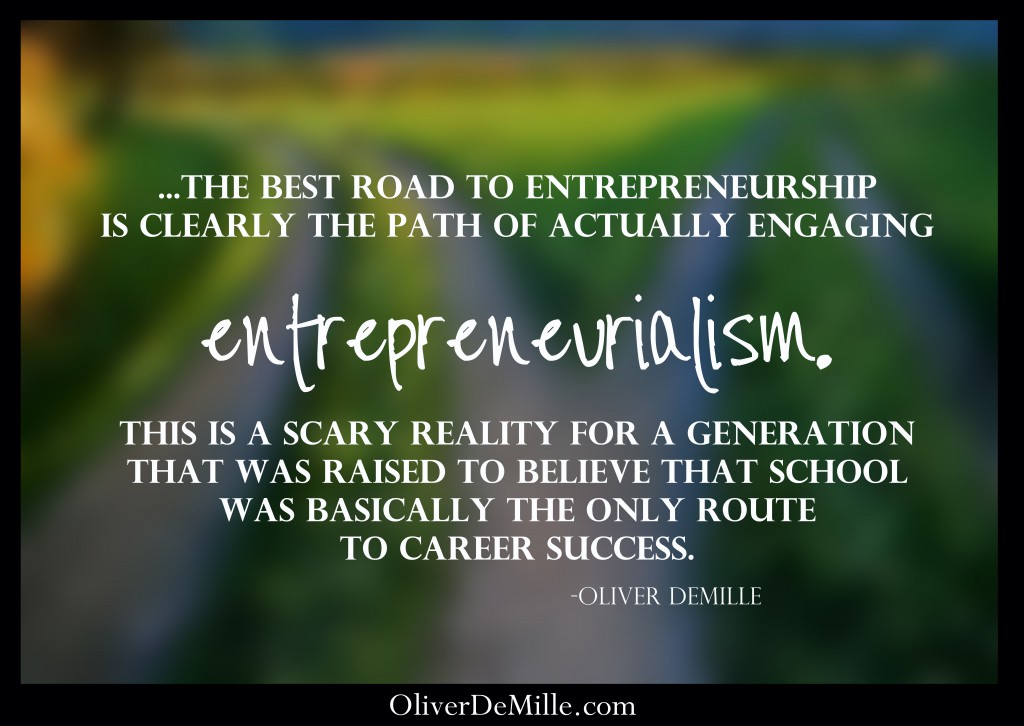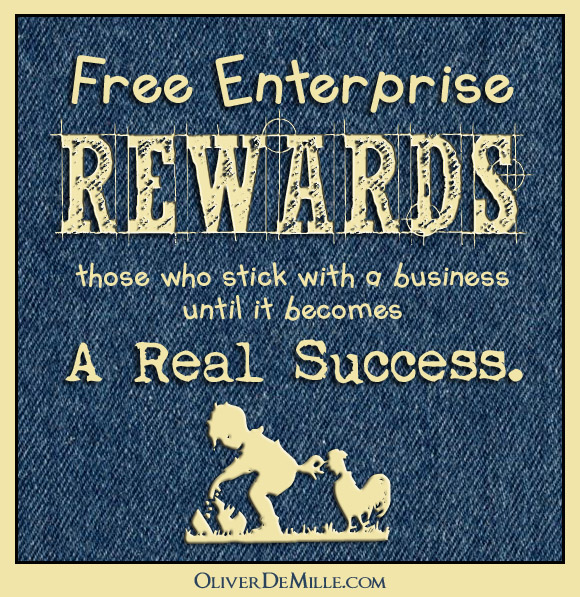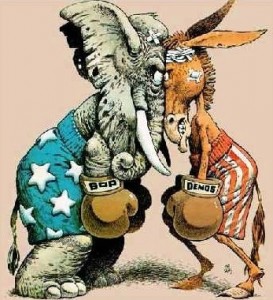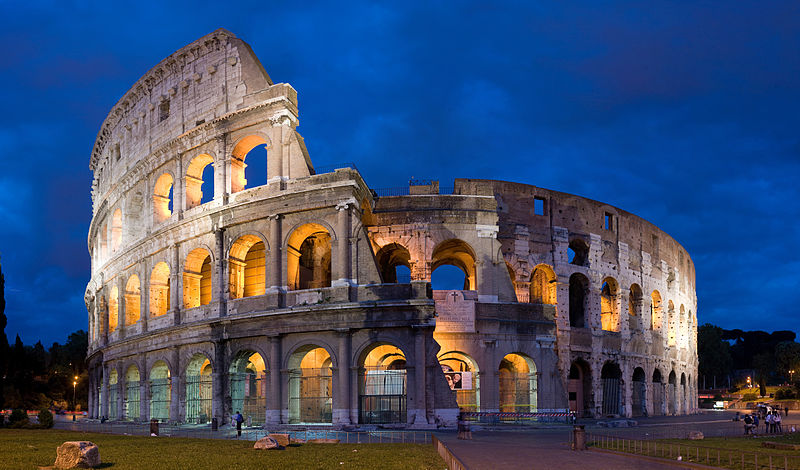An Update on the State of America: What’s REALLY Happening?
October 28th, 2017 // 4:41 pm @ Oliver DeMille
(It’s Not What You See On the News)
The Goal
I think every baseball coach I ever had repeated this advice like a mantra, and with good reason. A batter faces all kinds of distractions: players from the other team–both those on the field and those in the dugout–make a point of yelling, waving their arms, and doing whatever they can to distract a batter, to get him to take his eyes off the ball.
The catcher says things from behind the plate. The opposing crowd yells boisterously in the stands, waves banners or hats or small children, and some honk their car horns or chant pithy slogans in unison. The good batter learns to ignore all of this noise and mental clutter, to focus only on the ball—eyes on the ball, always.
The same focus is vital in politics. Most people realize this in a roundabout way, but they tend to think that media, the opposing party, and social media are trying to keep certain governmental leaders distracted. This does happen, but it’s not the real problem. In fact, media outlets and political parties trying to divert each other pale in comparison to the actual distraction.
The Diversion
 The real problem occurs when the citizens get distracted. When they “take their eyes off the ball.” Both political parties routinely try to get citizens focused on tangents, and one of the most effective ways is to attack each other.
The real problem occurs when the citizens get distracted. When they “take their eyes off the ball.” Both political parties routinely try to get citizens focused on tangents, and one of the most effective ways is to attack each other.
Nothing keeps people misdirected like a good bout of Washington name-calling. If that isn’t working, the media can be counted on to up the ante and intensify the rhetoric, spin, and accusations.
The more the citizens who tend to stay informed on the news can be diverted by such tactics, the less they tend to pay attention to their real role, their crucial responsibility—to keep the government in check, not let politicians and/or bureaucracies quietly (or loudly, for that matter) chip away at their freedoms.
The media are supposed to help this important work by keeping a close eye on government and calling attention to federal excess and abuse. Sometimes they do this well, but mostly they join the political parties and politicians in creating more noise, clamor and misdirection.
The Constitution gets attacked each month in a number of ways, but the media and parties tend to redirect the American people to other things, loud and emotional issues that spread anger, division, and a focus on personalities, parties, special interest groups, “who said what” and “who responded how”—and “how dare they!” While this is happening, our freedoms are whittled away behind the scenes.
For example, as Senator Mike Lee pointed out, if the bills passed by Congress in any given year are stacked in one pile, and the policies adopted by the sprawling federal bureaucracy during the same time period (without any vote in Congress and usually with little or no media coverage) are stacked in another, the bureaucratic pile is many times higher than the first. Yet hardly anyone knows what the myriad government agencies are writing, implementing, and enforcing; almost nobody has a say in what they decide; and few even know it’s happening. By the time such policies start directly hurting you and other people, it’s often too late.
This occurs year after year, decade after decade. Add to this the various court precedents and additional policies established by local, state and federal judiciaries, executives, and legislatures across the nation, along with international precedent, treaties, and agreements that American courts and the other branches of government are bound by or choose to comply with, and the “behind the scenes” pile of government regulations, policies, penalties and rules has grown (and is growing) even more quickly.
The Problem
The spread of governmental power in the past few decades has been almost exponential. Carly Fiorina was right when she repeatedly warned during the 2016 presidential primaries that America is being “crushed” under the overwhelming weight of regulatory overreach.
Yet this is seldom, almost never, mentioned in the media—mainstream or otherwise. It is simply a non-story for most Americans. Instead, the media distract us with the latest White House skirmish, presidential Tweet, ridiculous things said by the media, or outrageous words or actions by a political official (sometimes Republican, other times Democrat) or Hollywood celebrity, sports star or recording artist. Even sports shows, late night TV, and various celebrity-studded awards shows have recently joined the fray.
It all adds up to one glaring reality: Distraction, distraction, distraction. The problem isn’t so much that perception is reality, but that “the news cycle is reality” for far too many Americans. And, in fact, for a growing number of people “the latest post is reality.”
We are living in a new era of political interaction. “Get your daily distraction here!” Buy a magazine, turn on the news, or read the headlines on your smartphone—it’s often at least 99% distraction. And no, this statistic isn’t scientific, it’s just my best guess. A true scientific study of the facts would quite possibly show that 99% is a bit low.
The real issues, the most important realities, almost never pop up on the morning smartphone update. They only rarely appear in a television news program, and even the once-highly-trusted print media now serve up large swaths of distraction. We live in tabloid nation, at times, even when we try to follow the news.
The Shift
The truth is, I think most Americans kind of sensed this turn of events taking place during the 2015-2016 presidential elections. Media coverage was frequently so extreme that anyone who still trusts the media must not have watched the news during the past 24 months. Many on the Left are shocked by President Trump’s tweets; a lot on the Right feel the same way about the nightly news.
That’s what effective distraction is all about. It keeps us uneasy, concerned, worried about what the other (“evil”) party might do. This kind of intense media environment is like a drug—great for ratings, but often light on truth. Those who get hooked have to get their daily fix, shake their heads, and try to sleep at night even though the world is “so close to the edge right now”. Thanks to smartphones, too many of us are even addicted to the hourly fix, each new headline scrolling across the handheld screen to remind us to stay mainlined to the latest media report.
But there’s more to all this than initially meets the eye. At the same time we witnessed this momentous shift in American news and politics, especially its growing levels of intensity and divisiveness, we also experienced something else—mostly unarticulated, a feeling, a fleeting glimpse of…something. We’re not yet sure what it means, but it’s starting to look a bit like…dare we say it?…a new sort of wisdom.
For example, during the election a friend told me he was deeply worried Trump would win. When I pressed him for details, he explained that he thought Trump represented a spreading American authoritarianism. Not conservatism. Not liberalism or progressivism.
Just a desire to have someone strong in charge who would ignore the old political ways of doing things and instead just get things done, torpedoes-away-style if needed.
I asked if he thought Hillary would be better, and he responded that she’d be normal—corrupt, a politician, the kind of president the red states would hate and watch closely. But predictable. And therefore better.
Then he said the really profound thing that made me stop and think. “With Hillary in the White House and a large Republican majority in the House,” the government will be largely handicapped for the next four years. I like that.”
The Setup
He wasn’t just seeing things as liberal versus conservative. He was looking past media and party distractions and keeping his eye on the ball. Agree or disagree with his conclusions, but it struck me that his main focus was figuring out how his vote could help limit Washington.
Interesting.
The most intriguing thing about this conversation wasn’t the Hillary versus Trump issue, which for him seemed entirely secondary. His concern was that everything hinged on how to keep America from losing more of its freedoms. At the time, I thought it was a remarkable discussion.
 But then another friend told me he supported Trump all through the Republican primaries because he believed Jeb Bush, Marco Rubio, John Kasich, or any other mainstream politician might be elected along with Republican control of the House and Senate, meaning that there would be nobody to aggressively check their agenda.
But then another friend told me he supported Trump all through the Republican primaries because he believed Jeb Bush, Marco Rubio, John Kasich, or any other mainstream politician might be elected along with Republican control of the House and Senate, meaning that there would be nobody to aggressively check their agenda.
“But with Trump in the White House,” he predicted, “Republicans in Congress will work hard to check the president. He won’t get very much done—just a few big and important things like deregulation of past executive orders, a Right-leaning Court appointee, and major tax cuts. Congress will only support the things we really need, not all the Trump rhetoric.”
Again, we discussed the specifics, with me mostly asking questions, but the most interesting thing I took from this conversation was that he, too, was looking for an election outcome that would check and limit Washington. He had a very different view than the other friend, and ended up voting differently, but they both had the same top goals in mind—protect our freedom, reduce the power of Washington, reboot the Constitution.
Yet another friend took a drastically different viewpoint, but with the same ultimate goal. “I hope Hillary wins and both houses of Congress stay Republican, or that Trump wins and Democrats take control of the Senate,” she said. Then she ended with: “Anything to get the checks and balances working better.” Again: curtail Washington’s power and let the Constitution shrink the overreach of government.
After this third conversation, I stopped being surprised when this approach came up. I didn’t see it much in the national media, but I heard similar thoughts from at least a half-dozen other people. Unlike the other heated elections I’d closely watched since 1992, this time around a lot more people seemed to be seeking something more than “the better candidate.” They wanted to see real change in Washington, not through a candidate, but by setting up Washington to do more internal fighting and do less. They wanted to limit the government.
The Ball
Is this change occurring because people are starting to give up on party politics as a real solution to our national problems? Or are they reading the Constitution and founding ideas more deeply? Or, alternatively, are there growing concerns that Washington has just become too big, too unwieldy?
Was all this a coincidence? Maybe. Or perhaps there is a new wisdom, embryonic to be sure, rising in America. A new sense that if we want to be free, we’re going to have to look past blind trust in what the media tell us and dig deeper, think more deeply and independently about our freedom and our politics.
Or could it be even more simple: Could it be that the media tipped their hand in 2015-2017, clearly signaling to a lot of Americans that it is “all in” for bigger government, more power to Washington, and more support for leaders who want to expand that power? As a result, perhaps a lot more people are looking around for new and better ways.
If there’s one thing Donald Trump absolutely got right in 2016, it is that the time has arrived to “drain the swamp” that is Washington D.C. In fact, Barack Obama started his presidency with the same call for real change in Washington and the way it did business. So did Bill Clinton and Ronald Reagan, for that matter. All came to the Oval Office as outsiders, promising to put Washington back in line. History seems to be teaching us that presidents don’t change the swamp as much as they want to.
 If a new wisdom is percolating among the American people, it will need to use the power of the voting booth to put disruptors and real innovators in office—many offices—and never again settle for mainstream politicians and managers of the status quo (from either party).
If a new wisdom is percolating among the American people, it will need to use the power of the voting booth to put disruptors and real innovators in office—many offices—and never again settle for mainstream politicians and managers of the status quo (from either party).
To accomplish this, we’ll have to learn to largely ignore distractions from party politics and the manic media and instead keep our eyes on the ball:
What is undermining the Constitution
and our freedoms this month?
That is the question.
This is what is really happening in America.
And the stakes could hardly be higher: If we’re not up to the task, the elite politicians, bureaucracies, and media will win; families, middle America, the economy, and our posterity will be the losers.
Category : Aristocracy &Blog &Citizenship &Constitution &Culture &Current Events &Economics &Generations &Government &History &Independents &Information Age &Leadership &Liberty &Mission &Politics
One Great Challenge Facing America Today
August 26th, 2017 // 4:51 am @ Oliver DeMille
The Coming Fall
 Only 15 percent of Americans are on target to fund 1 year or more of their retirement. One single year. Yet many will live twenty to thirty years after retiring. This one fact alone is a major blow against conservatism.
Only 15 percent of Americans are on target to fund 1 year or more of their retirement. One single year. Yet many will live twenty to thirty years after retiring. This one fact alone is a major blow against conservatism.
It may in fact kill conservative principles and ideals in the next two decades, and it could deeply hurt the American economy and our freedoms in the process. This is not an exaggeration. Put simply:
How can conservatives expect to win elections or, even if they are victorious at the ballot box, actually pass conservative laws and policies when more than 85 percent of the American people are going to be fully dependent on someone else’s money for housing, food and clothing, health care, and other expenses during retirement?
With the massive Baby Boom generation moving into retirement, many analysts ask: how can the United States implement anything short of collectivist socialism in the next thirty years?
To cut away the safety net, or to default on the promised Social Security and healthcare benefits workers paid into for decades, would be immoral and create widespread poverty for many of our most vulnerable. To buck up and pay for these obligations, and supplement them with what will be needed for millions of retirees to just get by, will require levels of taxation and regulation that will truly be nothing short of…well, socialism.
Bottom Dollar
Few people want to admit this reality—Republican politicians least of all. But over sixty years of government promises, spending money that should have been saved, inflating the currency, and putting numerous regulatory hurdles in the path of entrepreneurialism, innovation, and economic growth have taken their toll. A national debt north of $20 trillion dollars (more than $100 trillion when all the obligations and liabilities are met, and a lot more as these obligations and interest on the debt increase every month) leave us little wiggle room.
There are two realistic responses. First, we can go after major economic growth. This will require a systemic change in our economy—meaning mass deregulation and getting the government almost entirely out of the marketplace. Tax rates must come down drastically, and foreign-held corporate money must be encouraged to repatriate without penalty. Foreign direct investment must also be recruited (another reason tax rates must be significantly reduced).
The second option is to keep on the current path until we default, then allow an IMF bailout of the U.S. and the replacement of the dollar as the world reserve currency with International Monetary Fund SDR currency or some other (probably electronic) legal tender. This will result in a major reduction of the standard of living for most Americans and an explosion of additional government handouts. Most retirement and other savings that do exist will be wiped out, and nearly all Americans will go on the dole, with a few elites at the top, and both socialism and globalism will dominate.
The amazing thing, to me at least, is that many of our nation’s leaders right now—in both parties—actually prefer the second option. Moreover, a lot of them believe that this is the best course for our future. They deeply believe in globalism, collectivist economics, and the end of America’s attachment to free enterprise, gun rights, family values, and religion. They believe that government is the greatest power on earth, and deserves our universal allegiance and support. Even, ultimately, reverence. Anyone who disagrees, they believe, is small-minded or caught in the past—or both.
New or Old
Not only do many Democratic leaders hold this view, but a surprising number of Republican officials believe it as well, or at least they vote like they believe it (which brings the same results). This is a real battle, and the globalist elites are winning. The media, most of academia, and a majority of politicians are on their side. In their view, the future of the world is at stake—either a bright future of globalism (with elites in charge) or a return to dark-age tribalism, as they see it (where the regular people rule through small-minded, unenlightened democratic influence), will ensue. They are determined to ensure the globalist outcome.
They literally consider it a war–and one that is worth winning, whatever the cost. If academia, media, Hollywood and the lobbyist/D.C. bureaucracy/political party-apparatus can force the Trump administration to back down from anti-globalist policies and behaviors, so be it. That’s what the hubbub is about on the nightly news, investigations, etc.
But if not, they’ll take more drastic measures. A currency default might do it, causing bank holidays and massive layoffs. Or a serious shakeup in the White House—brought on by the Special Counsel, indictment of the President, or something else that circumvents the will of the voters and instead chases the goals of the elite. Something unexpected, of the same magnitude, could trigger a return of White House alignment to globalist goals. Today’s elites in government, media, finance, etc. can hardly remember a time when globalism wasn’t the clear agenda. Most of them are outraged at the very thought.
The rest of America has a serious problem. Remember the 85 percent of Americans who don’t (or won’t) have enough retirement savings to last more than a year? How are conservatives going to effectively promote smaller government and a return to genuine free enterprise in a nation strapped with the $20 trillion-plus national debt, $13 trillion in consumer debt, over $100 trillion owed in debt plus unfunded liabilities, and many millions (and growing) of retirees who will desperately need financial support?
The Next Step
I’m an optimist, because I believe the best days of America and the world are yet to come. Usually I infuse my writings with optimistic ideas on how we can really improve things in the days ahead. But right now I have to admit that I’m concerned. I’m not sure how we get past the economic hole we’ve dug for ourselves—not just politicians, but the regular people as well. We are culturally, if not actually, dependent on government spending and government growth.
Yes, a lot of people want the government to cut back, but they can’t agree on what to cut. Almost all Americans want the government to keep spending for things that benefit them directly. The ones that support cuts mostly only support cutting other people’s government benefits. Thus Congress doesn’t actually fix much.
Unless this changes, Democrats will continue to be the party of bigger government and increased socialism while Republicans will talk about smaller government, limits, and Constitutional boundaries—but when the votes come to the Senate, truly conservative changes won’t have enough Republican support to pass, and when cases make their way to the Supreme Court, free enterprising systemic changes to the government-corporate-K Street nexus won’t have enough Justices behind them. Too many officials simply aren’t willing to do what needs to be done. It’s too hard, and too unpopular.
I’m not sure what can change this.
Of one thing I am certain, however. History is absolutely clear on this point. As goes entrepreneurship, so goes our nation. Ultimately, a major increase in effective entrepreneurship, innovation, and business ownership is going to make or break us. It will create growth if it happens, and that changes everything. Also, the future of entrepreneurship is something each of us can influence. Our next three decades will either bring massive economic growth or the rise of rampant socialism to America. To choose the path of growth, our government can help (by deregulation and choosing to be smaller)—but a lot more people engaging effective entrepreneurship is the indispensible. Period.
Category : Aristocracy &Blog &Citizenship &Constitution &Culture &Current Events &Economics &Entrepreneurship &Foreign Affairs &Generations &Government &History &Leadership &Liberty &Mini-Factories &Mission &Politics &Postmodernism &Producers &Prosperity
“The Coming Tide”
July 25th, 2017 // 7:22 am @ Oliver DeMille
A Prediction
 For decades the Democrats proudly saw themselves as the party of the little guy and the working poor. Republicans were considered the party of Wall Street, white collar professionals, and big business. But these alignments have changed during the opening years of the 21st Century. The Democrats are now, as The Atlantic put it, “a coalition of Millennials, minorities, and white professionals.” The Republicans consist of whatever is left over, which amounts to a majority of people in the large majority of states.
For decades the Democrats proudly saw themselves as the party of the little guy and the working poor. Republicans were considered the party of Wall Street, white collar professionals, and big business. But these alignments have changed during the opening years of the 21st Century. The Democrats are now, as The Atlantic put it, “a coalition of Millennials, minorities, and white professionals.” The Republicans consist of whatever is left over, which amounts to a majority of people in the large majority of states.
Perhaps the most striking thing about this new political arrangement is that so many white-collar professionals are now Democrats. Moreover, a large number of them are genuinely liberal, even progressive. This is a major departure from historical trends.
The most obvious reason for this shift is something members of the professional class have in common: years of participation in and graduation from the modern American university system. To find success in today’s campus environment often corresponds with embracing academe’s general values, processes, and views. When such views emphasize diversity of thought and vigorous debate of different ideas, the result is a certain kind of learning—and a certain kind of graduate. This approach helped make American universities the best in the world.
But when such views and values include rejection of diverse ideas, religious values, and pressure to adopt one overarching political and cultural perspective (pervasively advanced by the Left), a different result is natural. A different kind of typical graduate is also inevitable. This is where we find ourselves today. As the American campus has moved increasingly Left, the culture experienced and accepted by a large number of its participants has followed suit.
College Flight
This leaves many conservative or religious families, and others who aren’t particularly conservative or religious but don’t want their college youth to be ridiculed for their views or indoctrinated with blatant liberalism, with a difficult choice. College, long considered a required rite of passage into adulthood by many families, is becoming less attractive to a lot of people. The rebuttal is that the financial rewards of a college degree make it unavoidable. This boils down to two widely accepted but currently weakening views:
- College leads to financial success
- Financial success requires college
Perception is never quite as accurate as reality. Belief #1 (college leads to financial success) is a partial truth. It turns out to be true for some people, not true for others. In the 2010s, it is false for more than half of college graduates. Belief #2 (financial success requires college), on the other hand, is patently false. There are many people with financial success and means who dropped out of college or never enrolled at all. Indeed, many business owners who never finished college find their company bombarded with resumes and applications of those who did.
Certainly college is an effective path to career for many people. However, a downside for parents who aren’t committed liberal ideologues is the worry that many of today’s universities will turn their children into exactly that. And the biggest losers in the current system—even in the few schools where religious or conservative values are acceptable—are students whose focus on career prep distracts them from getting a truly great education. Sadly, this describes a significant majority.
II.
To be clear, all of this is part of a much larger national context. The bigger trend is that Americans are increasingly rejecting the 1960s promise of a society of experts who wisely and efficiently fix everything. The golden era of the American university was an outgrowth of this post-World War II zeitgeist: that everyone could participate in a society of experts, and that expertise and institutions held the solutions to all our national, world, community, material, and even personal problems.
Increased medical expertise and technology would make us truly healthy; better law schools and lawyers would ensure true justice to everyone; advanced technology and training in journalism would bring a golden age of media full of light and truth; business advances and expertise would eradicate poverty and bring prosperity to all. And so on….
The promise of what experts would bring the world was exciting, even intoxicating. True political experts, we were assured, would bring lasting peace, end conflicts, and spread happiness to every city and town. The Fed would ensure a stable and growing economy at all times, using modern expertise and financial algorithms to save us from major financial challenges. The promises were endless.
Over fifty years later, none of these expectations have been realized. Not even one of them. The entire “experts will fix everything” project is a bust. Just look at the current state of our politics, from the Clinton era to the Bush years, from Obama to Trump. Problems are far from solved. Many of our great national institutions, both public and private, have declined or lost their way. The citizenry’s trust of our government, and of experts in general, is lower and lower each decade.
In truth, the era of the expert is insolvent. It’s well past bankrupt, to be precise. We’re still training more experts, but they still haven’t solved the problems that caused us to want more of them in the first place. A lot of things have gotten worse. In short, something else is needed…
And soon.
What’s Next?
While national debts continue to skyrocket (more than doubling in the past 8 years), markets show increased volatility, and governmental credit ratings are downgraded, many of the experts assure us that things are getting better. But all they’ve shown is that they don’t really know what they’re doing. They know how to keep themselves well paid and in power, but beyond that, they haven’t fulfilled their purpose.
For example, imagine what would happen if we faced an economic depression like those the U.S. suffered in the 1930s, 1860s, or 1780s. When the Great Depression came, most Americans trusted the government, our leaders, and our national institutions. Today most citizens have very little trust in any of these; indeed, over sixty percent of Americas don’t trust the government to do the right thing most of the time. If crisis comes in this atmosphere of mistrust, few solutions from Washington will find enough traction to be successful.
This is a dominant characteristic of our times: We can’t seem to solve our national problems, big or small. We are mired in political squabbles, both between parties and within parties, and Washington accomplishes very little that actually helps the American people. It often causes harm, in fact.
As a people, we have largely lost trust not only in governmental officials and institutions but also in the media, Wall Street, Hollywood, the schools, big business…the list is long. Whom do we really trust as a people? Whom can we turn to in crisis—with real confidence they’ll fix things? In short, which experts do we really believe have our backs anymore?
If the promise of “experts will save us, and all our youth should become experts” doesn’t ring true anymore, what does? What is the answer? From the founding era through westward migration and the Industrial Revolution, the overarching goal of most Americans was to build a business and raise a family. This was our drive, our agenda. It was our national project, carried out by myriad individuals and families.
Then after World War II we turned our gaze in another direction: the career, a profession, education as job training, and daily life spent meeting the needs of the corporation or whatever organization employed us. In short, experts ruled and most people wanted to be experts. If they couldn’t swing it themselves, they at least tried to make it a reality for their children. Even family goals were expected to bend or give way to the interests of employers. Schools, likewise, were reorganized to separate, grade, sort, and point young people in the direction most likely to meet corporate needs. Experts oversaw the entire process, literally from cradle to grave and almost everything in between.
As the evidence of expert limitations grows, and as our national faith in the power of experts to solve our problems erodes and crumbles, what is left? Where will we turn? A whole generation of Millennials grapple with this situation in their work life, and more decide to opt out of the system than join it. Where are we headed?
III.
So far, nobody can definitively answer these questions. Time will tell, but in the meantime we must do our best to understand and prepare for the economy and world that is emerging in the post-faith-in-experts era. My opinion is  that the most likely path forward is to reconnect with our American roots and turn our sights once again toward entrepreneurship. Business ownership is, in fact, the historical American pastime. The fact that many people abandoned it for half a century only worked because a few business owners did things on a big enough scale to employ the many.
that the most likely path forward is to reconnect with our American roots and turn our sights once again toward entrepreneurship. Business ownership is, in fact, the historical American pastime. The fact that many people abandoned it for half a century only worked because a few business owners did things on a big enough scale to employ the many.
But eventually, like any system where the many depend on the few for survival and progress, the few began taking more and more of the profits and power for themselves. In history this was called aristocracy, in more recent times it has been called socialism, and in our day it often gets away with calling itself capitalism. But whatever we call it, such a model is a far cry from the free enterprise system that turned America into a world leader—based firmly on freedom and the goal of most people to be independent owners and build their own businesses.
If and when this goal once again permeates our national mindset and our people’s choices, we’ll see the rise of a nation of problem-solvers. At that point, we won’t be dependent on politicians to fix things, and as a result, things will actually get fixed. In the process, we’ll naturally see a decreasing attachment to political parties and the rise of a non-political majority of business owners and family raisers.
There was once a name for just such goals: “The American Dream.” It’s time to bring it back.
To put it succinctly: Experts won’t save us. Politicians won’t fix what ails our nation. The solution will come, if at all, from a cultural change that marks the resurgence of a certain kind of person. At one point in history, people around the world had a word for such independent-thinking mavericks who took risks and then worked incredibly hard to make their businesses flourish and grow. They called them “Americans.” What qualified one for such a title? A burning drive to build and lead one’s own business, and to raise a family and community of young people with the same goal.
I think we’ll witness the rebirth of this same “tide in human affairs” very soon. In fact, I believe it’s already begun. But it faces strong headwinds blowing in the other direction, so we need to do better if we want the American Dream to succeed again. This is our key to the kind of future we want to pass down to our children and grandchildren.
Families, schools, communities and parents can either raise a nation of “independents” or a society of “dependents.” One will bring freedom and opportunity, the other won’t.
It’s our choice, and the decision won’t be made in Washington — or even at the ballot box.
Category : Aristocracy &Blog &Citizenship &Community &Constitution &Culture &Current Events &Economics &Education &Entrepreneurship &Featured &Generations &Government &History &Independents &Information Age &Leadership &Liberty &Mission &Politics &Producers &Prosperity &Statesmanship
A 2017 State of the Union!
June 28th, 2017 // 7:47 pm @ Oliver DeMille
Where are We Right Now as a Nation, and Where are We Going?
The Not-Quite-New Normal
 This is the way we govern now: The White House is the prize. Majorities in Congress are the way to get closer to the prize. And the ultimate goal is to control the Supreme Court, because it now has almost ultimate power on whatever issue it engages.
This is the way we govern now: The White House is the prize. Majorities in Congress are the way to get closer to the prize. And the ultimate goal is to control the Supreme Court, because it now has almost ultimate power on whatever issue it engages.
This is the way we govern now. To win these prizes, the party out of power goes on the offensive. Its mantra is attack, attack, attack. Look at the last 8 years: the party out of the White House (Republicans) attacked the party in the White House (Democrats) with whatever scandal it could. Benghazi. Clinton emails. IRS targeting. Obamacare. Fast and Furious. Loretta Lynch on the tarmac. Obstruction of every White House project they thought they could slow down. Calling ISIS “the JV team.” Debts and deficits. Some of these needed to be openly and loudly addressed, yes. But this is the way we govern now.
This eventually brought Republican majorities in the House. Then the Senate. Finally, the White House. The same happened in the 8 years before that, from 2000 to 2008, only at that point the roles were reversed. Democrats attacked Republicans, especially those in the White House, with everything they could muster. Hanging chads. No WMDs. The outing of Valerie Plame. The Great Recession. The rise of fuel prices from a little over $1 per gallon to about 4 times that. False allegations that President Bush repeatedly skipped out on required military service. Carl Rove and Scooter Libby in a Special Prosecutor gone wild. More debt, big deficits, using the Justice Department to investigate political rivals of the White House. Again, some of these needed to be opposed, but this has become the center-point of our governance.
The eight years prior to that followed the same pattern, with the party roles once again reversed. Republicans attacked the Democrats with allegations of Lewinsky-gate and abusive behavior toward Paula Jones and other women by President Clinton, Impeachment by the House of Representatives for Perjury, China-gate, White House handling of the Waco and Ruby Ridge standoffs, Hillary’s proposed Health Care plan. In the decades before that it was Iran-Contra, “Read My Lips,” etc.
This is how we govern now. It’s not only the perpetual campaign, where even between elections both parties are fully engaged in tearing each other down, it’s also a high-stakes game of thrones where both sides are out for blood—and the losers are the American people. In short, as mentioned, this is how we govern now. And it’s not good for our nation.
Who, What, and Why
In fairness, a free media and open debate that keeps the government under constant scrutiny is necessary and helpful. It is a serious check on anyone in power. Where the American Framers put most of the checks in the hands of competing branches of government, modern technology has significantly increased the power of non-governmental actors such as media, academia, big business, and online providers, among others. When this increases the power and wisdom of the electorate, the changes are positive. But too often the reality is manipulative spin and constant attempts by media to sway the citizens rather than inform them, to guide and convince voters rather than just objectively tell them the facts.
Indeed, a great negative occurs where the electorate is dependent on powerful institutions for its knowledge of the facts and issues we face as a nation—or swayed by the tone in which elites attempt to skew the public’s view of world events. The power of such institutions to prejudice people has only increased with each passing decade and year, and while this has sparked increased media savvy among some people, it has also created a mob mentality, even groupthink, for many others.
One of the reasons many in the media—both Left and Right—loudly decry President Trump’s habit of tweeting is that this cuts such media personalities out of the picture. When top leaders speak directly to the citizens, the media model of the past three hundred years is turned on its head. If this ever works effectively on the large scale, many media professionals will need to find new employment.
But let’s be clear. Accuracy in the news hit a two-decade low in 2009, according to the Pew Research Center (September 13, 2009). Then it hit another low by 2012 (August 16, 2012). In 2016 and 2017, many citizens feel that accuracy is hard to find in any media. In fact, a number of people consider British media outlets more factual about U.S. news than American media organizations that seem increasingly biased. When asked what news is most accurate, the public is split along party lines.
As for the ability of the media to accurately predict elections, it has become clear in the last 5 national-level elections (in 2016 and 2017) that the mainstream media and polling models have it all wrong. They keep predicting the opposite of what actually occurs. The biggest problem in media is that an increasing number of people simply don’t trust it anymore. They want the media to be unbiased, objective, and share “just the facts,” but this isn’t what they experience when they read the daily paper or turn on the nightly news. Gallup reports that popular trust in the media is at an all-time low (wjla.com/news, June 18, 2017).
Important Questions
The solution, of course, is for the regular citizens to step up their game. As former CIA officer Bryan Dean Wright shared (Fox, June 20, 2017), intelligence officers vet their news by looking at “five different kinds of questions.” Citizens today need to do the same. For example, whenever we hear or read a news report, we need to ask ourselves:
-
- Who is the person sharing the news? Does he really know what he’s talking about? [If the source of news is “anonymous,” give it very little credence.]
-
- Is the person sharing the news actually in a position to have access to the original details? Or is he just repeating something he heard or read? [If he’s not the original source, be skeptical.]
-
- What is the motivation of the person/institution reporting the news? Liberal? Conservative? Independent? Objective? What is the reporter’s goal? [In the case of the mainstream media, the goal is often to get better ratings and seek promotions from elite powerbrokers, or even to directly sway people to a different political viewpoint.]
-
- What bias does the reporter/institution have? [If you don’t know, you can’t possibly trust what he says until you find out why he’s saying it.]
- Does anyone corroborate the story? Who? Are both sources trustworthy? [Journalists used to print nothing until they had at least two separate named sources confirming the same thing. Now media outlets frequently go to print or air without even one named source. Many such reports have turned out to be entirely false.]
It’s not that journalism schools have stopped teaching the principles and rules of good journalism, but rather that many newspapers and electronic news organizations simply ignore the rules and steam ahead—as long as they feel they can promote their pre-planned agenda. Buyer beware. Or, in this case, consumers of media beware. We’re frequently being lied to.
Indeed, much of modern media seems to approach journalism like the villainous media magnate Magnussen in Benedict Cumberbatch’s recent rendition of Sherlock Holmes. When pressed on accuracy, he says: “Facts are for history books. I work in news.”
Facts vs. News
There is a lot of wisdom in this short statement. It is one of the genuine mantras of life in the 21st Century, and it bears repeating:
“Facts are for history books. I work in news.”
The news in our time has largely become reality television—scripted, planned, twisted to support a pre-determined narrative and agenda. The only antidote is a citizenry that sees through it and responds accordingly.
This is the way we govern now. This is where we are, and where we’re headed—at least in the immediate future. Crisis after crisis after crises…repeated ad infinitum. If one crisis gets resolved, another is already in the wings—just waiting for prime time. That’s Washington today.
Will something change it? Maybe. Maybe not. But that’s not the important question. The true question is whether American citizens will see through the endless crises, attacks, spin, manipulations, and innuendo—and focus their attention on the things that really matter. If we do, and if we only support media and news that actually focus on the important things, and vote for leaders who do the same (regardless of media manipulation) in every election, we’ll help keep the nation on track. The media will howl and moan and scream and whine, but they can be taken with a grain of salt. We should listen to the media, hear what they have to say, but we should take our own counsel as citizens.
Up Next
The following maxim for the 21st Century is needed:
Perception isn’t reality.
Reality is reality. Wise citizens will grin at the uproar when the media is off base, because they know the real story is very simple:
- Is Washington deregulating the economy and people’s lives, or increasing freedom-killing regulation? Same with state and local government? Why/Why not?
- Is the economy growing or contracting? Why/Why not?
- Are we more safe from our enemies or less? Why/Why not?
- Is freedom growing or decreasing? Why/Why not?
These four simple questions and answers tell us whether our government is helping us go forward or backward. We just need to keep our eye on the ball. Let the news wail and shriek. Hear what they have to say, and really examine their reports. Think about what you hear, and ponder, analyze, question.
Then apply the four questions outlined just above, and respond accordingly. That’s the real news.
And one more thing: Help as many people as possible do the same.
Because this is the way we should govern: With the American people firmly, wisely, and independently in charge.
Category : Aristocracy &Blog &Citizenship &Current Events &Economics &Foreign Affairs &Government &Liberty &Politics &Prosperity &Statesmanship
Chaos in Current Events!
June 21st, 2017 // 8:50 am @ Oliver DeMille
History is Repeating Itself, But Do We Know Its Lesson?
Cycling Back Around
 This is a chaotic time. Political scandals, media lies, shootings and violence based on political disagreements, terrorist attacks in formerly safe places. For the American people, it’s both frustrating and scary.
This is a chaotic time. Political scandals, media lies, shootings and violence based on political disagreements, terrorist attacks in formerly safe places. For the American people, it’s both frustrating and scary.
It helps to step back and take a deep breath, then turn to history for answers. Since patterns frequently repeat, they can tell us a lot about what’s actually happening—beyond the anger and intensity of nightly news reports. They can also tell us what’s coming.
Here’s how things work. Since the beginning of written history society has been split between three groups: 1) those in power, 2) those who have some power but are seeking more of it in order to be at the top of the power pyramid, and 3) other people who just want to live their lives. The good news is that in the United States today, a higher number of people are free to enjoy life and seek to live their dreams than perhaps any other society in known history. That’s worth smiling about, no matter what the news tells us.
On the other hand, a lot of people today have a sense that things are heading in the wrong direction. We have a lot of problems, both here and abroad, and it often feels as if some spark will soon set off some kind of powder keg that leads to real crisis. It’s a feeling like many Americans experienced in the late 1930s and early 1940s, or in the late 1850s and early 1860s. The American founding generation felt it at the beginning of the 1770s. In each of these cases, that sense of unease and anxiety was eventually followed by drastic challenges—Pearl Harbor, the Civil War, the Revolutionary War.
Indeed, according to the cycles of history, we’re in that same turn of the pattern right now. It’s unclear exactly what will happen to bring bigger national crisis, but a lot of people feel a foreboding sense that something momentous is about to come.
The Best of Times, The Worst of Times
To put this in clear perspective, the news right now is a tale of four nations.
One: the business news reports almost daily signs of an economic upturn, more financial opportunity, and budding growth in a rebooting economy.
Two: international news reports increasing terror attacks, alarming danger signs in North Korea, Iran and from ISIS, and a looming energy building for more conflicts ahead with Russia and China.
Three: the mainstream media portrays the Trump White House and the Republican Congress as ineffective, and throws out daily allegations of Administration corruptions, lies, conspiracies and hidden agendas to hurt the nation.
Four: conservative media debunks these mainstream reports and points instead to the kind of alleged corruption on the Left: Loretta Lynch, James Comey, the Clinton Foundation, illegal leaks, violent “Resisters”, DNC collusion with the mainstream media, Hillary Clinton’s emails, etc.
It is amazing how often these competing sources of media tell exactly the opposite story about a given event from the day’s news. Most people listening to all the reports are left deeply confused, or cynical. And those who only listen to one news source are frequently surprised by what friends tell them about the news. “But I listened to the total opposite on the morning news! You must be remembering that wrong.”
To make sense of all this, let’s put aside the noise and distraction. Let’s be as blunt and direct as possible: We are living in one of those historical periods where we face an existence-level conflict. We are literally in the midst of an existential war. Such wars are both cold and hot, violent and emotional. They are deeply rooted in the conflict between major ideas—with two cultures battling to survive, to win, and to thrive. But each side feels that it must fully defeat an opposing culture in order to survive.
Such intellectual wars have always existed, but they only reach a crisis-point like the one we are now experiencing when certain factors align. First, instead of a general conflict among ideas, the populace finds itself facing off in a dramatic disagreement between two major viewpoints, two overall paradigms that cannot peacefully coexist. Second, the stakes are high enough that almost everyone in the society firmly picks one of the two sides. Even people who are usually moderate, or generally centrist in their views, feel strongly enough about the current situation to put aside their typical willingness to see both good and bad on both sides. They now clearly see one side as right and the other as wrong. Many people go further—they see their side as Good, and the other as Evil.
Third, and this is where—according to historical patterns—the real danger sets in, more and more people find their emotions leading them, and they stop really thinking about current events. Symbols, which are always important in society, become the main thing in such eras. Symbols take over. For example, we now live in a nation where millions of people don’t even consider a certain policy if it is supported by the Trump Administration. They immediately think they “know” it is bad, wrong, hurtful—as soon as the name Trump is attached. In contrast, millions of other people have the exact same emotional reaction to anything attached to the name Obama, or Hillary Clinton. Rationality, consideration, and even empathy, are largely ignored. Millions basically turn off their brains and simply react to symbols—and their reactions are emotional, charged, and frequently downright angry. This turns violent more often than in less extreme eras of history.
Diverging Paths
In the current environment, winning has become the only goal for many in leadership, and for a majority of the population. And winning itself is defined as having certain people in power and in office, and/or other specific people out of power and out of office. Nothing but winning is acceptable to far too many in positions of influence and power—both public and in the private sector.
But there is an even worse situation, and it is the one we are now living. This occurs when one side believes that winning is the only important thing, and is willing to go to any length, any extreme, to win, while the other side still believes that some things are more important than winning.
When this happens, the side that only cares about winning becomes truly extreme, loses its moral sense and ethical compass, and goes entirely on the attack, using any means and justification it can muster. The other side, still convinced that morality is more important than winning, holds back, tries to show restraint, and attempts to use reason and appeals to decency to make its case. The result, in history, is mixed:
- If an election is near, the anger gets channeled to the voting booth and a winning number of voters weigh in and throw their support behind the side arguing for decency, goodness, and wisdom.
- If no election is imminent, the anger grows and is expressed mostly by the political class: those on the full attack win, while the side seeking reason and decency loses.
We are now witnessing the latter scenario. And history is clear on this point: Nations are drastically hurt by this approach. It tore the United States apart in the 1960s, where we witnessed the assassination of a President and two other major national leaders, along with massive violence, cultural civil war, and the destruction of national trust and cooperation. Similar events tore nations apart during the French Revolution, the Russian Revolution, and Bismarck’s Wars. The French and Indian War, the War of the Roses, the 30 Years War, and a number of others followed the same pattern. World War I took Europe for a similar ride—or, more precisely, a similar culture war culminated in the muddy trenches full of blood and machine-gun casings that webbed the continent in World War I.
In each case, it came down to two great, competing ideas or cultures, large or powerful groups supporting each side, and, eventually, the rise of symbol to extreme levels that incited violence, irrationality, and all-out culture war. We are now witnessing the same stew. Any who aren’t alarmed, or at least deeply concerned, don’t understand the ebbs and flows of history.
The solution, as history teaches, is to clearly identify which idea is right—and reject the other. This finally ended the great conflicts listed above, whether the conflicting ideas were communism vs. democratic free enterprise, a divine right of kings vs. the inalienable rights of all, Nazism vs. parliamentary democracy, imperialism vs. self-determination, slavery vs. individual rights, etc.
Follow or Lead?
To make matters even more challenging, today we are engaged in two such wars at the same time. First, there is the battle of radical Islamic terrorism vs. democratic inalienable rights. The clear winner will be democratic inalienable rights, which is more popular than terrorism among Muslims and pretty much everyone else around the world. Only the terrorists themselves, a very small minority of the world’s population, think theirs is the right idea.
The second great war being fought right now for control of our future is more complex. More difficult. Indeed, it threatens to tear our modern societies apart. It consists of, to put it as directly as possible, the competing ideas of democracy vs. aristocracy.
Elites choose the latter. They think society should be run by a few, and that the rest of us should accept the rule of our “betters.” And be grateful.
This is the underlying battle of our times. It is the war being fought in Washington D.C. between the Establishment and the American voters, and in most of our schools (where young people are largely convinced that success consists of getting a job working for elites, showing gratitude to elites, and kowtowing to elites in return for the promised salaries, promotions, and employee benefits). It is the war being fought on our campuses, and in most of the television programs and movies we consume.
Sometimes the message from schools, campuses, and the entertainment media is blatant, while other times it is subtle. But the message is nearly always the same: “the values of elites are best”, and “the rule of elites in all walks of life is just the way things are—and the way things should be”. This viewpoint is repeated over and over: “The best we can do is fall in line and get the kind of education and careers elites want for us.” Few people are able to spend many years in this system without succumbing to its promises and threats.
Perhaps the very center of this war is the media. Nearly every mainstream media report today communicates the same message: elites are the answer, we all need to adopt and celebrate elite values, all other values are obsolete or inferior, the voters get it wrong when they don’t follow elite media guidance, and the best path for our children is to embrace elite values and get the kind of good jobs that are mostly available working for elites and furthering elite agendas. The message is clear, and it is repeated from many of our most venerated institutions: “Everyone who isn’t an elite, or working for elites, is a loser, an outsider, an inferior.”
The Choice Right Now
This is not an exaggeration. Step back, look at our society today, the culture wars that are brewing, the leaders and their battles, and the news media. We are the world described just above—run “of the elites, by the elites, and for the elites.” The United States is a society at war, and the war is democracy vs. aristocracy. Note that aristocracy is promoted by nearly all of our major societal institutions. We are a world where all men and women are created equal, to paraphrase Orwell, but some, the elites (and those who adopt elite values and work for their goals), are to be treated more equal than others.
When the voters put in presidents and other leaders approved by elites they are applauded by the same elites. Media, academia, television, movies and experts of all stripes laud such officials and those who voted for them. When voters elect anyone who threatens or challenges elite values or goals, these same institutions turn to full attack mode. It’s like a pack of jackals going after their worst enemy. It’s Lord of the Flies. The courts are brought to bear, the media is weaponized, schools and universities become arms of elite propaganda, and the bulk of professionals and experts turn their attention to reversing or amending electoral “mistakes.” The voters must be kept in their place. Their superiors must rule.
Again, to history—it has always been thus. In fact, this is what Burke and Santayana were talking about when they warned that those who don’t learn from the mistakes of history are bound to repeat them. Specifically: The aristocrats have always known how to respond when a bit of democracy raises its head in challenge. They lie, they attack, they use innuendo, they mischaracterize, they publish false reports—followed by more false reports. When they do tell the truth, they spin it to promote their narrative. Where possible, they employ character assassination. If these fail, they look for another way. Any way to bring back elite rule and control.
This can go two ways, history shows us. If the people are swayed by such elite manipulations and tactics, the elites quickly regain their power. If not, if the people hold strong against elitist lies, agendas, and domination, democracy spreads and free enterprise flourishes.
Make no mistake. No matter how it looks (and remember that elites almost single-handedly control how it looks), the battles we witness on the nightly news are not personality vs. personality or even political party vs. political party. Something deeper is afoot. Aristocracy and Democracy are at war. Rule by elites vs. rule by the regular people. This is a true fork in the road. We will either remain a democratic, free enterprise nation, or we will become a fully functioning aristocracy.
This is our choice. Right now. And it boils down to whether we let the media sway our views, or not.
Category : Aristocracy &Blog &Citizenship &Community &Constitution &Culture &Current Events &Economics &Education &Generations &Government &History &Independents &Information Age &Leadership &Liberty &Mission &Politics &Producers &Prosperity &Statesmanship













